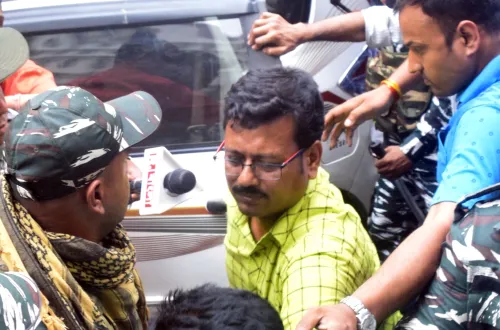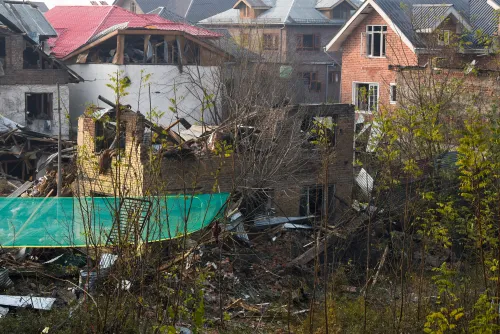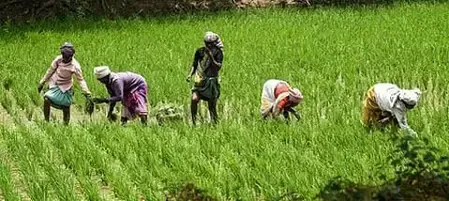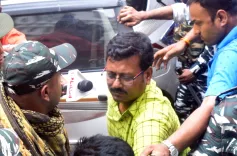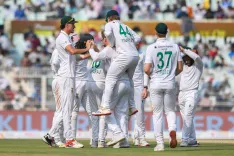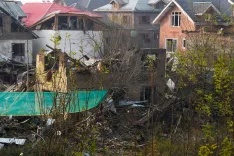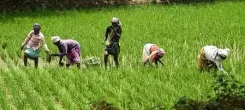How Does India’s Electoral Process Strengthen Democracy, and What Can South Africa Learn?
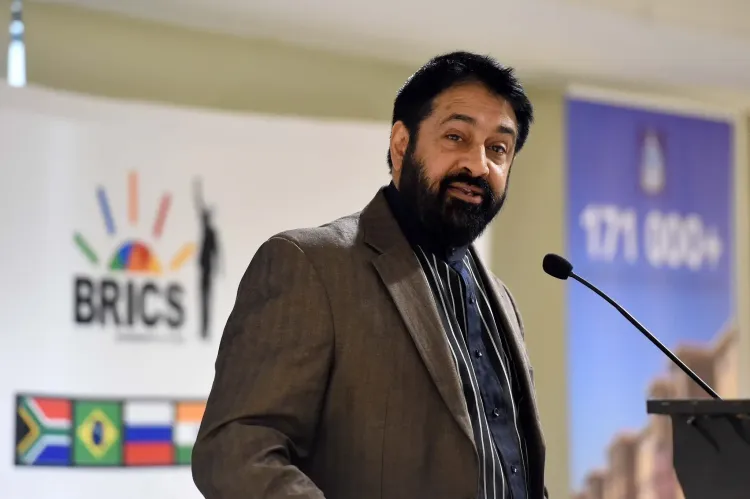
Synopsis
Key Takeaways
- India's electoral process is a model for promoting democracy and inclusivity.
- South Africa seeks to learn from India's experiences to enhance its own democratic practices.
- Collaboration between India and South Africa is essential for addressing global challenges.
- The Indian diaspora plays a pivotal role in strengthening cultural ties.
- South Africa's G20 presidency emphasizes solidarity and sustainable growth.
New Delhi, Nov 16 (NationPress) Anil Sooklal, the High Commissioner of South Africa to India, expressed admiration for the recent successful completion of the Bihar Assembly elections, viewing the process as a vital step in enhancing democracy and indicated that South Africa also draws lessons from it.
In a candid conversation with IANS, Sooklal commended India's dynamic democracy for executing the elections in an organized manner, emphasizing that inclusivity is currently the most crucial aspect globally.
He further elaborated on various topics surrounding India-South Africa relations, the upcoming G20 Leaders' Summit, chaired by South Africa, Prime Minister Narendra Modi's contributions to strengthening the Global South, and issues related to trade, technology, and security.
The following are edited highlights from the interview:
IANS: The results of the Bihar Assembly elections were recently announced, with PM Modi's BJP-led coalition emerging victorious, while Rahul Gandhi's Congress party faced a significant setback. What are your thoughts on the outcome?
Anil Sooklal: It would be inappropriate for me to comment on Indian politics. However, we observe developments in India, as is customary for diplomats. We monitor elections because, like India, South Africa is a vibrant democracy. I extend our congratulations to the Indian populace and government for the exemplary conduct of the elections, and I commend those who triumphed. This is the essence of democracy.
We had a South African observer team as part of the mission, as we seek to learn. India is the largest democracy, and managing elections with a population like Bihar's, which exceeds 100 million, surpasses South Africa's total population. The orderly and peaceful execution of your elections fortifies democracy and benefits us. Coming from a democratic society in South Africa, we see the potential for collaboration and mutual learning in deepening democracy, which is essential for the world today.
We increasingly witness actions by nations that lack inclusivity, are exclusionary, and act unilaterally. We must remember that democracy revolves around the people and their needs. Elections are vital for allowing individuals to choose their leaders through an inclusive and peaceful process, as demonstrated in Bihar.
IANS: As South Africa chairs the G20 Leaders' Summit, what key areas is the country concentrating on, and how do you intend to advocate for issues concerning the African continent?
Anil Sooklal: Upon assuming the G20 presidency, we articulated our theme and priorities. South Africa's theme, as stated at the outset of our presidency, is solidarity, equality, and sustainability. It builds upon the themes set by previous chairs, particularly Indonesia in 2022, followed by India and Brazil last year. The G20 is a continuous journey, and we aim to build on the achievements of not just the last four presidencies but also from when the G20 was elevated to a summit level in November 2008 in Washington.
Under this overarching theme, we have pinpointed several key priorities, including inclusive economic growth, tackling inequality and unemployment, and promoting industrialization, especially within the African continent and the Global South.
Moreover, we have continued the focus set by previous chairs on food security. We are also addressing issues related to AI and innovation for sustainable development, including data governance.
This will mark the first G20 summit held on the African continent, with South Africa as the host, being the only full African member state of the G20. Naturally, we will utilize this opportunity to highlight the African continent, especially its development challenges. Throughout the meetings, we have mainstreamed the African Union's Agenda 2063 and its action programs. We are emphasizing the African continental free trade area and exploring how the G20 can collaborate with Africa to enhance global trade.
Another significant issue is debt sustainability, which has been a critical topic on the G20 agenda, particularly given the repercussions of COVID on our economies. We aim to build on the G20 framework for debt established in 2020 when Saudi Arabia held the presidency. Debt sustainability hampers the growth of many African nations, with a substantial portion of GDP allocated to servicing debt. Thus, South Africa is focusing intently on this matter.
These are key concerns, but an additional crucial area under our working groups involves critical minerals—an increasingly vital subject for the global community. Africa is rich in these resources necessary for new technologies, particularly in our transition to green energy.
We are determined not to repeat historical patterns of trade with Africa, where the continent is merely viewed as a source of natural resources without benefiting from the process of beneficiation. Issues related to climate action will also be at the forefront, alongside discussions on reforming global governance structures, including the Bretton Woods institutions, the World Trade Organization, and the United Nations system, which traditionally feature on the G20 agenda.
IANS: How do you envision the evolution of India-South Africa relations in trade, technology, and security, particularly regarding the upcoming bilateral meeting between Prime Minister Modi and South African President Cyril Ramaphosa?
Anil Sooklal: The India-South Africa partnership is rooted in a shared history and remains historically significant. As nations of the Global South, both India and South Africa have endured exploitation and colonialism and have emerged from challenging pasts. We are members of numerous Global South organizations, with BRICS being a vital platform for collaboration with our other partners.
During Prime Minister Modi's visit to South Africa next week, he will not only participate in the G20 Summit but also attend an IPSA summit, representing the India-Brazil-South Africa grouping—a crucial platform of the Global South uniting three vibrant democracies that has existed for over two decades.
We also collaborate closely with India on climate change discussions within the basic group, and we are active participants in the global multilateral system, including the WTO and the UN.
At the bilateral level, as I mentioned, we share a historical bond. India was one of the first nations to support our anti-apartheid struggle and our quest for liberation. Since our transition to democracy in 1994, our relationship has flourished significantly. India ranks as our third-largest trading partner and stands as one of our most vital global allies. Our relationship is deeply rooted and continues to thrive.
I'm confident that during the bilateral meeting between Prime Minister Modi and President Ramaphosa next week, they will reflect on the relationship's current status and explore new avenues for cooperation in enhancing this crucial partnership, particularly in security, people-to-people connections, trade, investment, and cultural collaboration. Sports and culture are also significant pillars of our cooperation in solidifying ties between our nations.
IANS: Do you believe Prime Minister Modi plays a pivotal role in fortifying the Global South, especially following India's initiative to include the African Union in the G20?
Anil Sooklal: It is widely acknowledged that Prime Minister Modi is highly regarded globally, particularly within the African continent. He is especially esteemed in South Africa. We view him as a key global leader advocating for Global South issues, including those relevant to Africa. This will be Prime Minister Modi's fourth visit to South Africa in less than a decade, making him one of the Indian Prime Ministers who have visited South Africa the most. President Murmu has also made several visits to various African nations since taking office, underscoring the significance India places on its relationship with the African continent, including South Africa, which contributes to his high regard.
It is essential to remember that it was through his initiatives, alongside the Indian government's efforts, that the African Union was included as a full member of the G20 during India's presidency in 2023. African leaders have expressed their appreciation for the crucial role India, particularly PM Modi, played in achieving this inclusion.
IANS: You are the first Indian-origin diplomat from South Africa in New Delhi. Can you share your family's journey from India to South Africa?
Anil Sooklal: The migration of Indians from India began under British rule in 1834. After the abolition of slavery, the British Empire sought alternative sources of cheap labor to maintain its prosperity. India was viewed as a prime source of labor, leading to the transportation of Indians under the indenture system, which began in 1834, to Mauritius, followed by the Caribbean, South Africa, and Fiji.
My family history is intertwined with that era. My great-grandparents departed from a village in Ghazipur, Uttar Pradesh, and were sent to Durban, where I was born in the Natal province and assigned to work on a sugar plantation. I am a fourth-generation Indian, with roots in a village in Ghazipur, which I had the privilege of visiting last weekend. It was my first trip to Ghazipur, where I participated in the Ghazipur Literary Festival, allowing me to trace my family's heritage.
This journey was a pilgrimage not just for me but for my entire family back in South Africa. Many from the Indian community were excited about this return to our origins. India is as much a part of my identity as Africa is, and I am fortunate to embody the fusion of these two cultures.
IANS: What role do you believe the Indian diaspora in South Africa plays in enhancing the connection and shared cultural heritage between the two nations?
Anil Sooklal: I firmly believe that any diaspora community serves as a bridge between their country of residence and their country of origin. Currently, the Indian diaspora is vast and one of the most significant globally, with nearly 35 million Indians living abroad.
South Africa hosts one of the largest Indian diaspora populations, with Africa home to approximately 3.5 million individuals of Indian descent—half of whom reside in South Africa. The Indian-origin population in South Africa is close to 1.75 million.
There exist strong cultural and interpersonal ties between individuals of Indian descent and India, as well as the broader South African community. This vibrant connection spans various dimensions, including business, familial relationships, and cultural aspects such as spirituality, music, art, dance, Bollywood, cuisine, and attire. Our cultural heritage is actively preserved, with around 200-300 temples scattered throughout South Africa. The religious practices of the Indian community remain closely linked to India, with many undertaking pilgrimages, such as during the Mahakumbh, where hundreds of South Africans participated.
The diaspora community is a crucial link between South Africa and India, significantly contributing to deepening ties between our two nations.
IANS: As South Africa's Ambassador to India, what would be your primary focus in further strengthening the relationship between our two countries?
Anil Sooklal: My priority is to enhance our relationship with India at every level—economically, through trade and investment, and via people-to-people interactions, while seeking out opportunities for collaboration. India has been instrumental in helping us with skills development, capacity building, and educational exchanges between our students and academics, as well as joint research in science and technology. We can also benefit from India's success in key sectors.
We aim to leverage technology in agriculture for the advancement of our people. India's digital public infrastructure is an excellent example of how technology can accelerate a nation’s development.
Additionally, we are eager to strengthen cooperation with India in the medical and pharmaceutical sectors, as numerous opportunities exist in this arena. Tourism is another vital area of focus; we hope to see an increase in Indian tourists visiting South Africa. Unfortunately, we currently lack direct flights between our two countries, which hampers both business and tourism sectors. We are in discussions with various airlines in both South Africa and India, and we are optimistic about establishing a direct flight next year.
India is a vast nation, and I have been fortunate to travel to several states regularly to gain a deeper understanding of India and to ensure that diverse communities have exposure to what South Africa has to offer, thereby enhancing interactions between our peoples.
It's noteworthy that the migration of Indians to South Africa primarily originated from five regions: Gujarat, Uttar Pradesh, Bihar, Tamil Nadu, and Andhra Pradesh. We have vibrant Tamil, Telugu, Hindi, and Gujarati-speaking communities in South Africa, and strengthening ties with all these communities, as well as with other states of India, is a significant focus for our embassy.
IANS: What is the current status of the allegations and sanctions against the Gupta family? Are there any discussions with India or other nations regarding this matter?
Anil Sooklal: I do not possess any information about their current whereabouts. My government has addressed certain issues regarding their stay in South Africa. The relationship between India and South Africa transcends individual cases; it is a government-to-government, state-to-state relationship. It is a robust partnership that continues to flourish, enriching both nations through this historic friendship. Prime Minister Modi's visit to South Africa will be a pivotal occasion for further reflecting on this critical relationship.
I am not updated on the Gupta family situation. My primary focus remains on deepening government-to-government relations.

